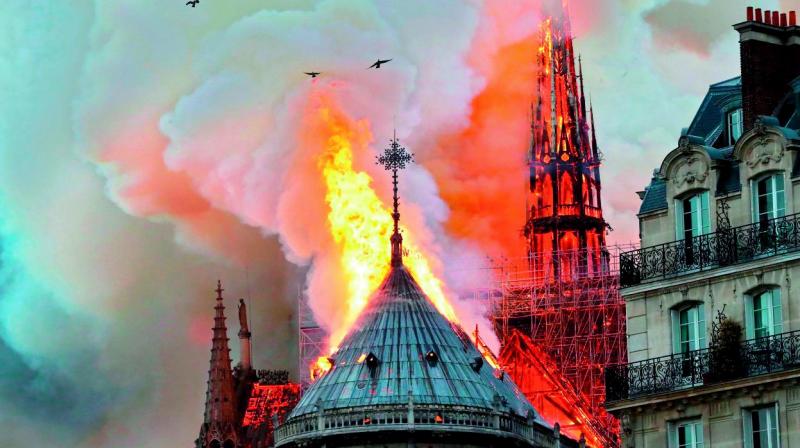A monumental loss!

Anyone who has been to Paris will understand the catastrophic loss the city and the world at large is facing as parts of the historic Notre-Dame Cathedral, built during medieval times, was reduced to ruins in a raging fire that lasted for more than eight hours.
While conservation architects estimate that the damage is likely to be monumental, French President Emmanuel Macron vowed to rebuild the cathedral with help from the international community, even as people in the city expressed shock and sadness over the incident.
Especially heartbreaking is the fact that the majestic structure, which dates back to 1163 AD, would have lost much of its original French Gothic architecture, says conservation architect Abha Narain, who first visited in 1996.
Art critic Uma Nair adds, “It is so heartbreaking to think of something that is nearly a thousand years old as destroyed. It’s almost impossible to recreate a spire, and even the stained glass, the technique does not exist today. The cathedral going up in flames feels like a warning. When you think of the things man has done to man, and to nature, it’s like a higher power telling us, ‘What are you doing with what I gave you?’.”
Room for error
The cathedral is understood to have been undergoing restoration work when the fire broke out. Speaking about the dangers of such work on heritage structures, Abha Narain explains, “Such structures are always vulnerable, but even more so during restoration work because one has to introduce a large work force and materials at the place. Even if the authorities took precautions, at the end of the day, there is always room for human error and an accident can happen anytime.”
Immense damage
The cathedral is also bound to have suffered immense damage given that fire can shatter stone structures. “Fire can shatter stone and since all the vaulting at the cathedral is made of stone, there would have been immense damage. The timber in its roof must have also completely burnt down. Only a proper assessment can reveal the extent of the damage the fire has caused to the structure as well,” says Narain. But since the Notre-Dame Cathedral is one of the most documented buildings in the world, it may be technically possible to restore all that was lost, just not the originals. Rues Narain, “The stained glass windows would not have survived the fire. The lead would have melted and shattered. So even though they can be recreated, they will always be the new stained glass, and will not have the patina of time.”
All is not lost
Meanwhile, a pair of bell towers immortalised in Victor Hugo’s tale The Hunchback of Notre-Dame has survived, along with most of the cathedral’s elaborate stonework facade. Valuable artifacts including the Crown of Thorns, believed to be a relic of the passion of Christ, are also believed to have been saved in the fire.
Spectacular beauty
From its beautiful stained glass windows, finely detailed sculptures of Biblical figures, ornately carved wooden stalls and massive pillars, the cathedral would attract more than 12 million people a year. A climb to the top of its twin towers offered the most spectacular view — a close-up look of the historic buildings in the city, including the two remaining natural islands on the Seine — Ile de la Cité and Ile Saint-Louis; the museum Louvre and the spectacular Panthéon. The mood inside the cathedral was more sombre, yet grand. Home to one of the most impressive organs in France, the cathedral could seat up to 9,000 people! “I have not visited the cathedral, but my son was in Paris for many years and had an exhibition and some of the stained glass windows of Notre-Dame were part of the exhibition. He said that he had never seen stained glass windows that were so dramatic and powerful,” adds Nair.

